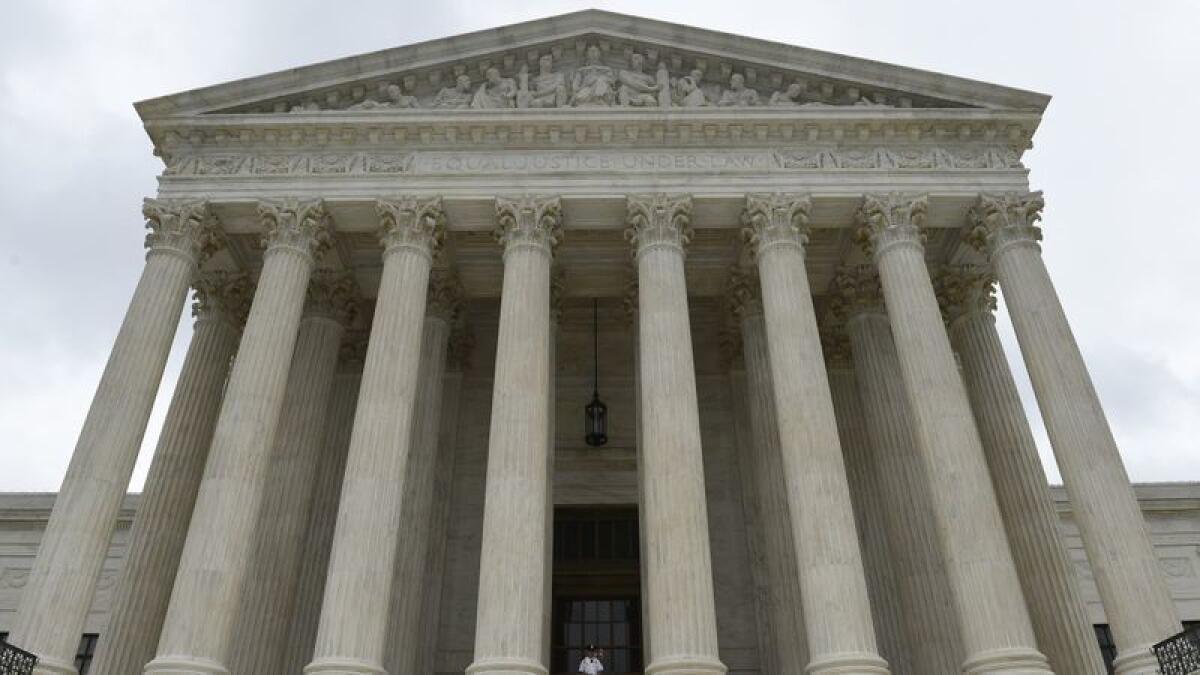Alabama execution delayed after divided Supreme Court misses deadline to act

- Share via
Reporting from Washington — A bitterly split Supreme Court issued a 5-4 order early Friday morning to allow Alabama to execute a murderer by lethal injection, but he was spared because the decision came nearly three hours after his execution warrant had expired at midnight Thursday.
Alabama authorities said they would move to set a new execution date for Christopher Price, who was convicted in the stabbing death of an elderly pastor in 1991.
The middle-of-the-night legal battle revealed a growing divide between the court’s five conservatives and four liberals over carrying out the death penalty.
The Alabama case centered on Price’s claim that he should not be put to death by lethal injection, but with nitrogen hypoxia. The nitrogen gas deprives the lungs of oxygen and renders a person unconscious. It has been hailed by some as a pain-free method of execution, but it is also an untested method of execution.
A federal judge had granted a 60-day stay of execution to examine that option, and the 11th Circuit Court of Appeals in Atlanta refused to lift the order.
Shortly before 9 p.m. Thursday, Alabama Atty. Gen. Steve Marshall filed an emergency appeal with the Supreme Court, asking the justices to lift the lower court orders.
It went to Justice Clarence Thomas, who oversees the 11th Circuit, and he referred it to the full court. Five justices voted to allow Price’s execution to proceed. They include Chief Justice John G. Roberts Jr. and Justices Thomas, Samuel A. Alito Jr., Brett M. Kavanaugh and Neil M. Gorsuch.
They said in a short statement that Price was given the option in June to elect nitrogen hypoxia for his execution, and he did not do so, even though 48 other inmates elected that option. “He then waited until February 2019 to file this action and submitted additional evidence today, a few hours before his scheduled execution time,” the high court said in an order issued at 2:52 a.m. Eastern time Friday. It granted the state’s appeal and lifted the stay orders issued by the lower courts. But the midnight deadline had passed by then.
It was unclear why the court missed the deadline, but Justice Stephen G. Breyer argued strenuously that the court should slow the process to consider Price’s claim.
He wrote an anguished a seven-page dissent accusing the majority of a heedless, midnight rush to judgment. Justices Ruth Bader Ginsburg, Sonia Sotomayor and Elena Kagan agreed.
“Should anyone doubt that death sentences in the United States can be carried out in an arbitrary way, let that person review the following circumstances as they have been presented to our court this evening,” Breyer said. “This case comes to us on the assumption that executing Christopher Lee Price using Alabama’s current three-drug protocol is likely to cause him severe pain and needless suffering. Price submitted an expert declaration explaining why that is so.”
Breyer continued: “Price proposed nitrogen hypoxia as an alternative method of execution. Alabama expressly authorized execution by nitrogen hypoxia in 2018, and state officials have actively worked to develop a hypoxia protocol since that time. The state is mere months away from finalizing its protocol.”
Two weeks ago, the court issued another 5-4 opinion to uphold a pending execution in Missouri and said the Constitution does not guarantee a “painless” death.
Gorsuch, speaking for the court, faulted death-row inmates and their lawyers for waiting until the eve of an execution to lodge new appeals. However, the liberals said the Missouri execution should be stopped because it could lead to a “gruesome and grotesque” scene because of the inmate’s rare medical condition.
Noting that the state of Alabama had sought relief from the Supreme Court late on Thursday evening, Breyer said he had requested that the matter be discussed by the entire court during conference on Friday.
“I recognized that my request would delay resolution of the application and that the state would have to obtain a new execution warrant,” he wrote. “But in my judgment, that delay was warranted, at least on the facts as we have them now.”
Breyer’s request for conference was apparently denied, but the deadline was missed anyway.
Alabama Gov. Kay Ivey in a statement said: “This evening, the state of Alabama witnessed a miscarriage of justice. But days before Christmas in 1991, Christopher Lee Price brutally took the life of Pastor Bill Lynn. This horrendous crime left Pastor Lynn’s wife and family to grieve, and now, almost 30 years later, the family is still left with no closure.”
In early February, the court by the same 5-4 vote lifted a judge’s order and allowed Alabama to carry out an execution by lethal injection. Then the court’s four liberals dissented because the majority rejected the inmate’s plea to allow his imam to be with him in the execution chamber.
Since then, the justices blocked an execution in Texas after a similar religious discrimination claim was filed. Kavanaugh issued a short opinion to explain that while the state may decide to allow only prison employees in the execution chamber, it may not allow a Christian cleric but not a cleric of another faith.
More stories from David G. Savage »
More to Read
Get the L.A. Times Politics newsletter
Deeply reported insights into legislation, politics and policy from Sacramento, Washington and beyond. In your inbox twice per week.
You may occasionally receive promotional content from the Los Angeles Times.











